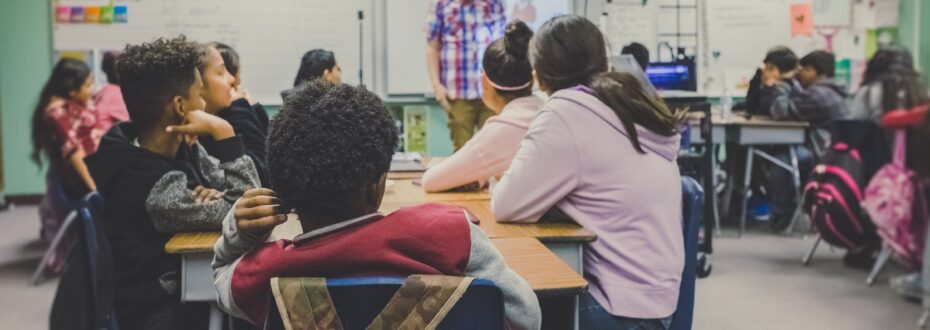Every year, thousands of young people are subject to some form of restrictive intervention in England for challenging behaviour. This may involve the use of restraint, seclusion, exclusion and detention to deal with poor behaviour.
Today, we published our latest briefing on trauma, challenging behaviour and restrictive interventions in schools – bringing together the latest insight and research in this hotly debated area.
Why focus on this?
It is estimated that around one-third of children are exposed to traumatic events before they turn 18, and around one in three diagnosed mental health conditions in adulthood are directly related to adverse childhood experiences, according to research by YoungMinds.
We know that schools often struggle to deal with difficult or challenging behaviours in the classroom. Sometimes these behaviours can lead to a child harming themselves or others around them. However, more often than not, challenging behaviours cause low-level disruption and the effectiveness of restrictive interventions in this respect is being widely contested.
Our briefing reviews alternative forms of behavioural management such as positive behavioural support and trauma-informed approaches which can contribute to improved outcomes, including attendance and attainment.
The key trends and issues
Not all forms of restrictive practices in schools are recorded or routinely reported. According to the Challenging Behaviour Foundation, the use of restraint and seclusion in schools in particular remains unregulated. There is currently no clear guidance from the Department for Education (DfE).
While there is an absence of data on restraint and seclusion in schools, here are some of the other key facts and trends in this area:
Exclusions
- There has been a steady increase in fixed period exclusions across all state-funded primary, secondary and special schools. DfE data records an 8% increase between 2016/17 and 2017/18. The rate of permanent exclusions in all schools has remained overall stable.
- Edward Timpson’s recent review of school exclusions found that disadvantaged pupils are being disproportionately excluded from school settings with over three quarters (78%) of permanent exclusions being issued to children with special educational needs or those in receipt of free school meals. The review also found that Black Caribbean children are 1.7 times more likely to be permanently excluded than White children.
Unexplained school exits
- Last year, data sourced by the Education Policy Institute found that as many as one in ten pupils (based on a 2017 cohort) experienced an unexplained exit during their time in secondary school. Analysis of this data by the Centre for Social Justice (released this week) investigated moves from mainstream schooling to alternative provision (AP). They found that one in five local authorities reported lower than average permanent exclusions, but above-average rates of unexplained exits to AP for in the same 2017 cohort.
Elective home education
- We have seen a significant rise in elective home education. There are currently 52,770 children being home educated, according to the Office of the Schools Adjudicator. Several local authorities have reported increases of between 40 to 70% in recent years in the numbers of children who are home educated.
Unregulated schools
- Some children who are withdrawn or excluded in schools may also end up in an unregulated school where their learning and safety may be compromised. Last year, Ofsted revealed there are 480 suspected illegal schools in England.
Restrictive interventions can do more harm than good
Children who display challenging behaviour in school are more likely to have experienced past traumas, such as abuse and neglect. Neuroscience research shows that persistent childhood trauma alters the wiring of the brain for survival, affecting children’s ability to self-regulate their emotions and behaviour. Our briefing finds the use of restrictive interventions such as seclusion, restraint or exclusion can have the potential to re-traumatise children and therefore contribute to further challenging behaviour.
Guidance by the Department for Education allows the use of seclusion or isolation rooms to manage disruptive behaviour providing that it is proportionate and is clearly outlined in the behavioural policy of the school. The guidance also states that: ‘the penalty must be reasonable in all the circumstances and that account must be taken of the pupil’s age, any special educational needs or disability they may have…’.
However, recent high-profile cases demonstrate that a child’s circumstances are not always appropriately considered. For children with identifiable mental health problems or special educational needs and disabilities (SEND), restrictive interventions such as the use of isolation booths can be especially damaging and exacerbate their difficulties.
Exclusion from school is associated with numerous poor outcomes, including poor attainment and future life chances. For example, only 7% of children who were permanently excluded and nearly one in five (18%) of those who received multiple fixed period exclusions went on to achieve good passes in English and maths GCSEs.
Other evidence highlights a link between school exclusions and crime, such as knife crime. Indeed, research by Ofsted suggests that children who are excluded from school are twice as likely to carry a knife. A group of young people from South London have also been running their own campaign on the ‘school to prison pipeline’ highlighting the effects of school exclusion and the opportunities for positive interventions.
Putting progress at risk?
Awareness about the lasting effects of exclusions and other forms of restrictive intervention has led to a significant drive to keep children in schools and implement approaches to help improve behaviour.
Last year, the Chief Inspector of Schools promised to clamp down on ‘off-rolling’ – which involves the removal of pupils from the school roll without the formal issuance of a permanent exclusion, leading to pupils effectively being excluded through the backdoor. The rising numbers of children being home educated has been linked to this phenomenon. The new Schools Inspection Framework has introduced changes to recognise this practice.
The Department for Education has also updated its guidance on behaviour and mental health in schools to help school staff detect underlying emotional and mental health needs and to establish strategies to respond appropriately.
However, there is a risk that such initiatives may be undermined by proposals from the new Government. The Conservative Manifesto 2019 outlined commitments to tackle poor behaviour in schools and give headteachers more power to exclude pupils. The potentially punitive nature of these policies is worrying, especially proposals for a zero-tolerance approach to discipline.
For instance, there have been increased calls for dedicated police officers in every school to keep children safe. However, there are concerns about the possible implications of this, including the over-scrutiny of particular groups of children who are already likely to be criminalised and therefore may subsequently fuel the school to prison pipeline.
Trauma-informed schools benefits all pupils
Our previous research found that building on the protective factors in a school environment is important in both managing behaviour and promoting children’s overall wellbeing.
Positive behavioural support strategies and trauma-informed approaches in schools are key to reducing the use of restrictive interventions, as they promote a supportive environment and consider pupil’s individual circumstances. Establishing a whole school approach to trauma and mental health helps create a culture where every student’s potential is recognised and valued. While these approaches are not a magic bullet, they can help schools prevent incidents, reducing the need for restraint and seclusion.
We must strive to ensure all schools celebrate difference and neurodiversity and recognise the importance of inclusive education, regardless of a child’s challenges and needs.
The use of restrictive interventions in schools is gaining long-overdue attention, and some promising initiatives are being implemented in schools. The Equalities and Humans Rights Commission Scotland is also in the process of developing which may have broader implications for schools across Britain.








